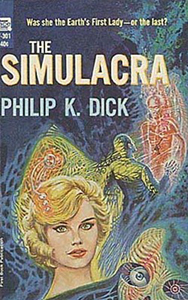“The Simulacra” (written in 1963, published in 1964) is one of Philip K. Dick’s grand absurdities. It’s an expansion of his amusing short story “Novelty Act,” about a pair of jug musicians who dream of performing at the White House for the First Lady – who is actually an actress, and whose husband the president is actually a simulacrum.
PKD throws in elements of novels that were unpublished at the time, including “We Can Build You,” “The Broken Bubble,” “The Man Whose Teeth Were All Exactly Alike” and “Humpty Dumpty in Oakland,” along with new satirical concepts like living advertisements that people swat down like pests.
An effective hodgepodge
Among his “hodgepodge” books – where several ideas are mashed together – “The Simulacra” is one of the more effective because it doesn’t lose sight of its central critique of a two-class system: the government class and the common class.

“The Simulacra” (1964)
Author: Philip K. Dick
Composition year: 1963
Genre: Science fiction
Setting: United States of Europe and America, mid-21st century
Almost every common citizen hopes to become part of the government class, because that’s where the steady jobs, high pay and societal prestige lie. For the few people who want to live free, emigrating to Mars is the best option.
Several of “The Simulacra’s” large cast of characters think about moving to Mars the way PKD characters in other books think about killing themselves. In a funny moment in chapter 12, one of the jug players – whose day job is at a small operation that produces simulacra – decides Martian emigration is his best option since a government contract doesn’t seem to be in the cards:
“Okay,” Ian said, wondering what he should take with him. What would he need on Mars? Toothbrush, pajamas, a heavy coat?
Total government control
Set in the mid-21st century, “The Simulacra” explores how the government – the United States of Europe and America – controls the economy and people’s lives, and how citizens accept it as a given. A psychiatrist, Dr. Egon Superb, is going to lose his job not because people don’t want his services, but because the government has outlawed his profession. The pharmaceutical industry has purchased the right people in power.
Loony Luke (also in “The Broken Bubble”) and his top salesman, Al (also in “Humpty Dumpty”), sell jalopy spaceships good for a one-way trip to Mars from their roving lot. Their profession could be outlawed at any time, but they still exist because they are too small to be noticed, for now.
People can get kicked out of their apartments (living quarters and status symbols, a concept also featured in “The Man Who Japed”) if they don’t pass their mandatory USEA history tests. Everyone is required by law to join the Democrat-Republican Party.
PKD notes the German — particularly Nazi — influence on the USEA, as Germany has been admitted as the 53rd state. The democratically elected president has a German name (he’s actually a robot, but the populace doesn’t know that).
The corporation with the government contract to build presidential simulacra is German. First Lady Nicole Thibodeaux hopes to use the government’s time-travel equipment to bring a World War II Nazi official into the present day as a consultant.
New robot overlord
Although PKD hedges his bets by portraying the USEA rather than the straight-up USA, his statements about ignorant voters apply to any democracy. People elect a robot, not knowing it’s a robot. The First Lady, if she weren’t actually a series of actors, would be 90 years old, but no one thinks about that. And in actuality, the First Couple are a front for the unelected council that truly makes policy for the USEA.
Nicole thinks about overthrowing the council and gaining true power, but then she despairs in one of the book’s funniest lines, in chapter 13:
To stay in power she would have to rule a nation of the mentally ill. And the idea did not very much appeal to her.
A lot of the details of “The Simulacra” are unnecessary. As noted, this could be the USA rather than the USEA; there’s no need for the Nazi stuff when America has itself nationalized industries and/or created cartels via its policies.
When the time-travel device is mentioned, it’s often to say that the officials dismissed a possible outcome because it was statistically remote. Thankfully, the time-travel stuff doesn’t add confusion to the book, but that’s also a reason why it doesn’t need to be there – a serious treatment of time travel should be confusing.
A subplot about three Alan Lomax-esque folk-music recorders (their recording device is an alien creature, natch) who travel to northern California ends with their discovery of “chuppers” (from “The Man Whose Teeth Were All Exactly Alike”).
Not sustainable, even for the corrupt
This is for the sake of a grim but funny final statement that Neanderthals will rise again in the wake of the civil war between the Army and the National Police. Here, PKD seems to be reveling in his concept from another 1963-penned novel, “Dr. Bloodmoney,” that post-war survivors will carve out a pleasant if primitive community north of the Bay Area.
Then again, perhaps it’s unfair to say parts of “The Simulacra” aren’t necessary. This is a satirical novel about how government (especially of the big and centralized variety) is not necessary for the common man to lead a good life; every absurd detail of this world adds to that theme.
Government is only necessary for government leeches to lead good lives – but the system is not sustainable even for them. At some point – it’s up to each reader to decide if we’re already there or if there’s still time for robot figurehead presidents — things get particularly absurd, and that’s followed by civil war.
“The Simulacra” is in some ways a mess, but that’s appropriate because it’s about how a messed-up nation – and everyone in it — will inevitably fall apart. As simulacra-factory worker Chic (who steals his brother’s wife and runs off to Mars with her) puts it in chapter 15:
That was the terrible thing about civil war; no matter how it came out it was still bad. Still a catastrophe. And for everyone.


